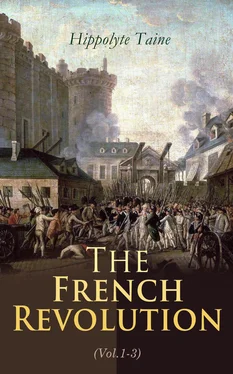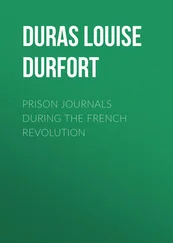Among these are men of every rank, profession, education, and party. They are distributed by hundreds and thousands over the whole surface of the territory. They write apart, without being able to consult each other, and without even knowing each other. No one is so well placed for collecting and transmitting accurate information. None of them seek literary effect, or even imagine that what they write will ever be published. They draw up their statements at once, under the direct impression of local events. Testimony of this character, of the highest order, and at first hand, provides the means by which all other testimony ought to be verified.—The footnotes at the bottom of the pages indicate the condition, office, name, and address of those decisive witnesses. For greater certainty I have transcribed as often as possible their own words. In this way the reader, confronting the texts, can interpret them for himself, and form his own opinions; he will have the same documents as myself for arriving at his conclusions, and, if he is pleased to do so, he may conclude otherwise. As for allusions, if he finds any, he himself will have introduced them, and if he applies them he is alone responsible for them. To my mind, the past has features of its own, and the portrait here presented resembles only the France of the past. I have drawn it without concerning myself with the discussions of the day; I have written as if my subject were the revolutions of Florence or Athens. This is history, and nothing more, and, if I may fully express myself, I esteem my vocation of historian too highly to make a cloak of it for the concealment of another. (December 1877).
BOOK FIRST. SPONTANEOUS ANARCHY.
Table of Contents
CHAPTER I. THE BEGINNINGS OF ANARCHY.
Table of Contents
I.—Dearth the first cause.
Table of Contents
Bad crops. The winter of 1788 and 1789.—High price and poor
quality of bread.—In the provinces.—At Paris.
During the night of July 14–15, 1789, the Duc de la Rochefoucauld-Liancourt caused Louis XVI to be aroused to inform him of the taking of the Bastille. "It is a revolt, then?" exclaimed the King. "Sire!" replied the Duke; "it is a revolution!" The event was even more serious. Not only had power slipped from the hands of the King, but also it had not fallen into those of the Assembly. It now lay on the ground, ready to the hands of the unchained populace, the violent and over-excited crowd, the mobs, which picked it up like some weapon that had been thrown away in the street. In fact, there was no longer any government; the artificial structure of human society was giving way entirely; things were returning to a state of nature. This was not a revolution, but a dissolution.
Two causes excite and maintain the universal upheaval. The first one is food shortages and dearth, which being constant, lasting for ten years, and aggravated by the very disturbances which it excites, bids fair to inflame the popular passions to madness, and change the whole course of the Revolution into a series of spasmodic stumbles.
When a stream is brimful, a slight rise suffices to cause an overflow. So was it with the extreme distress of the eighteenth century. A poor man, who finds it difficult to live when bread is cheap, sees death staring him in the face when it is dear. In this state of suffering the animal instinct revolts, and the universal obedience which constitutes public peace depends on a degree more or less of dryness or damp, heat or cold. In 1788, a year of severe drought, the crops had been poor. In addition to this, on the eve of the harvest, 1101a terrible hail-storm burst over the region around Paris, from Normandy to Champagne, devastating sixty leagues of the most fertile territory, and causing damage to the amount of one hundred millions of francs. Winter came on, the severest that had been seen since 1709. At the close of December the Seine was frozen over from Paris to Havre, while the thermometer stood at 180 below zero. A third of the olive-trees died in Provence, and the rest suffered to such an extent that they were considered incapable of bearing fruit for two years to come. The same disaster befell Languedoc. In Vivarais, and in the Cevennes, whole forests of chestnuts had perished, along with all the grain and grass crops on the uplands. On the plain the Rhone remained in a state of overflow for two months. After the spring of 1789 the famine spread everywhere, and it increased from month to month like a rising flood. In vain did the Government order the farmers, proprietors, and corn-dealers to keep the markets supplied. In vain did it double the bounty on imports, resort to all sorts of expedients, involve itself in debt, and expend over forty millions of francs to furnish France with wheat. In vain do individuals, princes, noblemen, bishops, chapters, and communities multiply their charities. The Archbishop of Paris incurring a debt of 400,000 livres, one rich man distributing 40,000 francs the morning after the hailstorm, and a convent of Bernardines feeding twelve hundred poor persons for six weeks 1102. But it had been too devastating. Neither public measures nor private charity could meet the overwhelming need. In Normandy, where the last commercial treaty had ruined the manufacture of linen and of lace trimmings, forty thousand workmen were out of work. In many parishes one-fourth of the population 1103are beggars. Here, "nearly all the inhabitants, not excepting the farmers and landowners, are eating barley bread and drinking water;" there, "many poor creatures have to eat oat bread, and others soaked bran, which has caused the death of several children."—"Above all," writes the Rouen Parliament, "let help be sent to a perishing people. … Sire, most of your subjects are unable to pay the price of bread, and what bread is given to those who do buy it "—Arthur Young, 1104who was traveling through France at this time, heard of nothing but the high cost of bread and the distress of the people. At Troyes bread costs four sous a pound—that is to say, eight sous of the present day; and unemployed artisans flock to the relief works, where they can earn only twelve sous a day. In Lorraine, according to the testimony of all observers, "the people are half dead with hunger." In Paris the number of paupers has been trebled; there are thirty thousand in the Faubourg Saint-Antoine alone. Around Paris there is a short supply of grain, or it is spoilt 1105. In the beginning of July, at Montereau, the market is empty. "The bakers could not have baked" if the police officers had not increased the price of bread to five sous per pound; the rye and barley which the intendant is able to send "are of the worst possible quality, rotten and in a condition to produce dangerous diseases. Nevertheless, most of the small consumers are reduced to the hard necessity of using this spoilt grain." At Villeneuve-le-Roi, writes the mayor, "the rye of the two lots last sent is so black and poor that it cannot be retailed without wheat." At Sens the barley "tastes musty" to such an extent that buyers of it throw the detestable bread, which it makes in the face of the sub-delegate. At Chevreuse the barley has sprouted and smells bad; the "poor wretches," says an employee, "must be hard pressed with hunger to put up with it." At Fontainebleau "the barley, half eaten away, produces more bran than flour, and to make bread of it, one is obliged to work it over several times." This bread, such as it is, is an object of savage greed; "it has come to this, that it is impossible to distribute it except through wickets." And those who thus obtain their ration, "are often attacked on the road and robbed of it by the more vigorous of the famished people." At Nangis "the magistrates prohibit the same person from buying more than two bushels in the same market." In short, provisions are so scarce that there is a difficulty in feeding the soldiers; the minister dispatches two letters one after another to order the cutting down of 250,000 bushels of rye before the harvest 1106. Paris thus, in a perfect state of tranquility, appears like a famished city put on rations at the end of a long siege, and the dearth will not be greater nor the food worse in December 1870, than in July 1789.
Читать дальше












